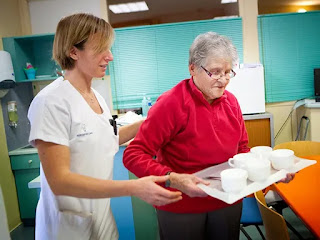Amyotrophic lateral sclerosis (ALS): A progressive, degenerative disorder that affects the nerve cells that control muscle movement.
Amyotrophic lateral sclerosis (ALS), also known as Lou Gehrig's disease, is a neurological disorder that affects the nerve cells responsible for controlling voluntary muscles. These nerve cells, also known as motor neurons, degenerate and die over time, leading to muscle weakness, atrophy, and eventually paralysis.
The cause of ALS is not fully understood, although genetic and environmental factors are believed to play a role. In some cases, the disease appears to be inherited, while in others, no clear genetic cause can be identified. Exposure to toxins, traumatic injuries, and viral infections may also increase the risk of developing ALS.
Symptoms of ALS typically begin with muscle weakness, particularly in the arms and legs, and may progress to difficulty speaking, swallowing, and breathing. There is currently no cure for ALS, and treatment primarily focuses on managing symptoms and improving quality of life. This may include medications to relieve muscle cramps and stiffness, breathing support, and physical therapy. Research into potential new treatments and therapies for ALS is ongoing.
There is currently no cure for Amyotrophic lateral sclerosis (ALS), but there are treatments available that can help manage symptoms and improve quality of life for those with the disease.
The main goal of ALS treatment is to help maintain muscle function and slow the progression of the disease. Treatment options may include:
1. Medications: There are several medications that can help manage the symptoms of ALS. These may include muscle relaxants, pain relievers, and medications to manage excess saliva and mucus.
2. Speech Therapy: Speech therapy can help those with ALS maintain their ability to
speak and swallow.
3. Occupational Therapy: Occupational therapy can help those with ALS maintain their
independence by recommending assistive devices and modifications to their home and work environments.
4. Respiratory Therapy: Respiratory therapy may be needed to manage breathing
difficulties that can occur as a result of the weakening of the muscles responsible for breathing.
5. Nutritional support: Maintaining proper nutrition is important for those with ALS. A
dietitian can help recommend dietary changes and supplements to ensure adequate nutrition.
6. Clinical Trials: There are ongoing clinical trials for new treatments and therapies for
ALS. Participation in these trials may provide access to experimental treatments that are not yet available to the general public.
It's important to note that the course of ALS can vary widely from person to person, and treatment plans will be tailored to the individual's specific needs and symptoms. A multidisciplinary approach involving healthcare professionals from different specialties may be needed to provide the best possible care for someone with ALS.
There is currently no scientific evidence to support the use of homeopathic remedies for the treatment of Amyotrophic lateral sclerosis (ALS). Homeopathy is a form of alternative medicine that is based on the belief that "like cures like", meaning that a substance that causes symptoms in a healthy person can be used to treat similar symptoms in a sick person when diluted to extremely small doses.
While some people with ALS may try homeopathy or other alternative therapies to manage their symptoms, it is important to note that these treatments have not been scientifically proven to be effective in treating ALS. In fact, relying solely on alternative therapies and delaying or forgoing proven medical treatments for ALS can be dangerous and may hasten disease progression.
If you or a loved one has ALS, it is important to work closely with a healthcare professional who specializes in ALS care to develop a comprehensive treatment plan that addresses your individual needs and symptoms. This may include medication, therapy, and other supportive measures to help manage symptoms and improve quality of life.
There is no scientific evidence to support the use of Unani medicine for the treatment of Amyotrophic lateral sclerosis (ALS). Unani medicine is a traditional system of medicine that originated in ancient Greece and has been adapted over time in different parts of the world, including the Middle East, South Asia, and Central Asia. It is based on the principles of balancing the four humors, or bodily fluids, to achieve health and well-being.
While some people with ALS may try Unani medicine or other alternative therapies to manage their symptoms, it is important to note that these treatments have not been scientifically proven to be effective in treating ALS. In fact, relying solely on alternative therapies and delaying or forgoing proven medical treatments for ALS c






No comments:
Post a Comment